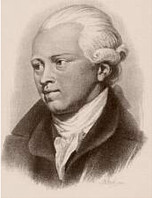
Birth of Denis Fonvizin, playwright, publicist, translator
Denis Fonvizin, the famous writer Catherine's era, was born April 3 (14), 1745 in Moscow into a noble family.
Denis Ivanovich came from a Livonian knightly family, which settled in Moscow in the 16th century.
Fonvizin got his initial education under the guidance of his father, Ivan Andreyevich. In 1755, the boy entered the newly opened school under Moscow University. In winter of 1759, among the best students, Denis went to St. Petersburg, where he was presented to the curator of the Moscow University Count Ivan Shuvalov. During that trip Fonvizin met Mikhail Lomonosov and the leading actors of the imperial theater F. G. Volkov and I. A. Dmitrievsky. That meeting, as well as the visit to the theater impressed a lot Denis Ivanovich.
On his return to Moscow Fonvizin entered the Faculty of Philosophy at the University of Moscow. Young student stood out among his comrades by the ability to perfectly translate from foreign languages. Owing to favorable reference of one of the professors, he was offered by the university bookseller to translate the fables of L. Golberg. That first literary work of Denis Ivanovich was published in 1761. After Golberg, Fonvizin began to translate the novel of Abbe Jean Terasson "Heroic virtue, or the life of Seth, the Egyptian king," then the tragedies of Voltaire and others.
In 1762, having graduated from the university, Fonvizin was appointed a Guards Semenov regiment sergeant. However, thanks to a good knowledge of foreign languages, Denis Ivanovich was given a post in the Collegium of Foreign Affairs. Aptitude of the young Fonvizin attracted the attention of the Chancellor, Count Mikhail Vorontsov, who entrusted him to translate the most important dispatches. The following year Fonvizin was appointed secretary of the cabinet minister I. P. Elagin, who was in charge of reviewing the petitions to the Emperor, and from 1766 - of the imperial theaters too.
In 1764, Fonvizin went on vacation to Moscow. In that period of life Denis Ivanovich wrote some of his poems and made new translations (P. Bitobe’s poem "Joseph," J. J. Barthelemy’s story "Love of Carita and Polydor"). In 1768, Fonvizin finished his famous comedy "Brigadier," which satirized the mores of the nobility, their passion for everything that was French. The comedy made a strong impression on the audience of the time and held the stage.
In 1769, Fonvizin became the secretary of the head of Ministry of Foreign Affairs Count Nikolai Panin. On behalf of the count, Fonvizin wrote "Discourse on the indispensable state laws." Yhe work sharply criticized the regime of autocratic Russia. Author condemned the situation when "people constitute the property of other people," advocated granting of political rights to all classes. That work was distributed in handwritten copies and subsequently influenced the Decembrists.
In 1782, a new comedy by Fonvizin "The Minor" appeared on the stage. It became a landmark work of Russian literature. Comedy was a huge success. The author pointed to the root of all problems in Russian - serfdom system. He ridiculed the noble upbringing and education. According to Nikolai Gogol, "The Minor" - "...is a true social comedy."
After the death of Count Panin in 1783, Fonvizin retired in the rank of state councilor. At the time, Fonvizin’s works were published in "The interviewer of lovers of Russian word" founded by the director of the Academy of Sciences, Catherine Dashkova. He participated in the drafting of the first scientific dictionary of the Russian language - "Dictionary of the Russian Academy."
In the last years of his life the writer was seriously ill, his material well-being also declined. However, he continued his literary activities.
In the evening of November 30 (December 11), 1792 Fonvizin brought to Derzhavin his new play "Chamberlain." That evening was the last in the life of Denis Ivanovich. In the morning of 1 (12) December 1792, the famous writer and translator died. He was buried in the Alexander Nevsky Lavra.
Based on the Presidential Library’s materials:
Словарь Академии Российской. СПб., 1789. Ч. 1: От А до Г;
Денис Иванович Фонвизин. СПб.,1900;
Сочинения Д. И. Фонвизина: Полное собрание оригинальных произведений. СПб., 1902.

